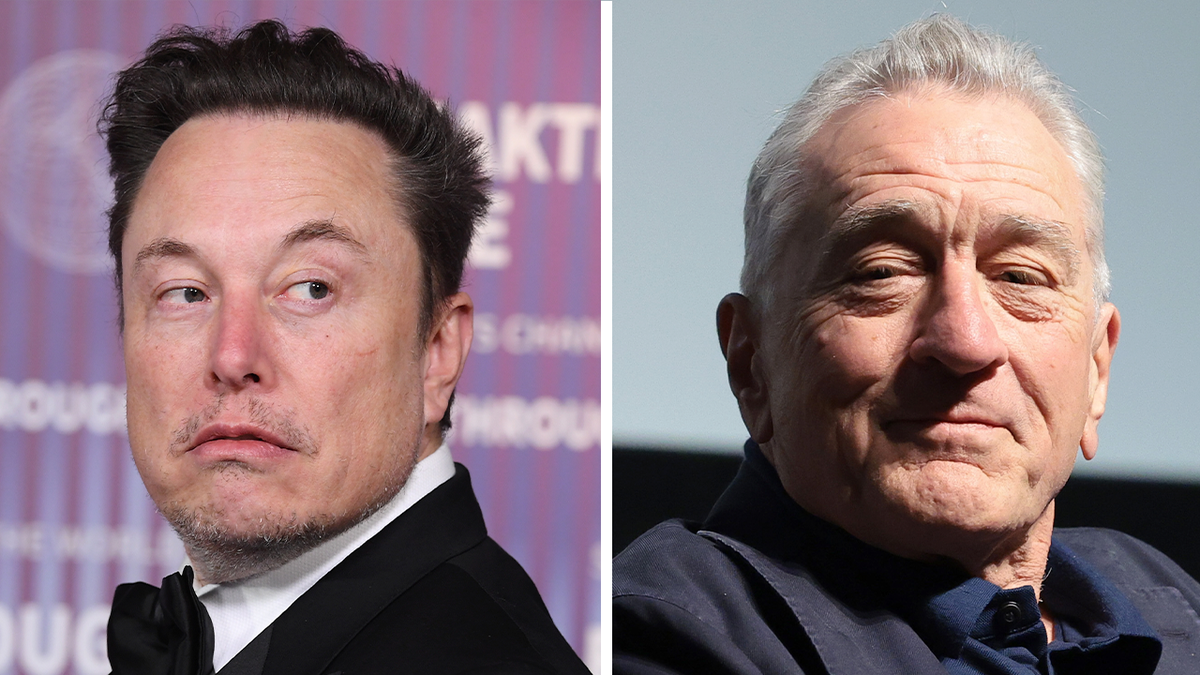World News
Elon Musk fires back at Robert De Niro for comparing Trump to Hitler, Mussolini: ‘Makes no sense’

X owner Elon Musk blasted actor Robert De Niro on his social media platform Friday after the “Heat” star compared former President Trump to infamous dictators Adolf Hitler and Benito Mussolini.
Musk replied to a clip of De Niro’s statements from MSNBC’s “11th Hour with Stephanie Ruhle,” stating that Trump’s policies “bore no resemblance” to those of both dictators and declared that the actor’s latest anti-Trump tirade “makes no sense.”
During the segment – which aired on MSNBC Thursday evening – De Niro declared that Trump “can’t be anywhere near the office of the presidency,” and called him “sick” and “narcissistic.”

Elon Musk criticized Robert De Niro after the actor recently compared former President Trump to Hitler and Mussolini. (1. Steve Granitz / Contributor 2. )
“There’s not one redeeming thing in him I can see ever. Ever,” he said.
He also explained to Ruhle what he would say to voters who are holding their nose to vote for him in the 2024 presidential election: “I don’t understand it. I don’t, I don’t think they understand how dangerous it will be if he ever, God forbid, becomes president. I don’t think they really understand.”
He continued, comparing the former president to some of history’s worst figures. “And historically, from what I’ve seen, even in Nazi Germany, they had it with Hitler. They don’t take him seriously. ‘He looks like a clown. Acts like a clown.’ Mussolini. Same thing. These guys, I don’t know why, they look like clowns.”
“But it would be chaos beyond our imagination,” De Niro said, contemplating the idea that Trump could win the White House again.
Once the clip hit X, Musk felt the need to speak out. He replied, “Well, Trump was actually already president for 4 years and his policies bore no resemblance to those of Hitler, so this makes no sense.”
ROBERT DE NIRO ‘DEEPLY DISTRESSED’ BY DEATH OF 19-YEAR-OLD GRANDSON

Robert De Niro on the set of HBO’s “Real Time with Bill Maher.” (Screenshot/HBO)
He also pointed out an example of Trump’s policies that the twentieth century dictators wouldn’t have pursued, stating, “In fact, with the Abraham Accords, he made some progress towards peace in the Middle East, which was definitely not high on Hitler’s agenda.”
De Niro’s anti-Trump rhetoric has been a staple of his public persona in recent years.
The actor, who played the villain in Martin Scorsese’s 2023 crime drama “Killer of The Flower Moon,” compared Trump to his character at the Cannes Film Festival last year, saying they both have a “feeling of entitlement” that drives their evil actions.
“It’s the banality of evil, and we see it now with — I’m not going to say the name because that guy is stupid,” he said, elsewhere adding, “It’s like with Trump — I had to say it,” he added. “There are people who think he could do a good job. Imagine how insane that is.”
One of De Niro’s most famous anti-Trump outbursts happened on stage during the 2018 Tony Awards, where he clenched his fists and told the audience, “I’m gonna say one thing: F— Trump! It’s no longer down with Trump, it’s f— Trump!”
CLICK HERE TO GET THE FOX NEWS APP
World News
University of Pennsylvania police arrest anti-Israel agitators on campus

Several anti-Israel agitators were arrested at the University of Pennsylvania on Friday night after hundreds of protesters descended into a campus building and attempted to occupy it.
Police confirmed to Fox News Digital that there were multiple arrests at the university’s Fisher Bennett Hall on Friday night. It is unknown at this time how many were arrested.
The UPenn Police Department announced in a community notice that a “large disorderly crowd” began gathering at 8 p.m. on Friday, and moved into Fisher Bennett Hall on the university’s campus and attempted to occupy it.
Law enforcement advised students to “avoid the immediate area.”

Pro-Palestinian protestors stage an encampment at the University of Pennsylvania in Philadelphia, Pennsylvania, United States April 25, 2024. (Getty Images)
Campus police, along with assistance from the Philadelphia Police Department, escorted the protesters from the campus building.
In an 11 p.m. update, authorities said that the protesters had dispersed.

An anti-Israel encampment is removed Friday at the University of Pennsylvania campus in Philadelphia. (WTXF)
The occupation came one week after police dismantled an encampment that had taken over part of the Ivy League’s campus for two weeks.
In a statement, members of the Penn Gaza Solidarity Encampment accused the University of Penn administration of not negotiating with them in good faith over “Penn’s investment with Israel.”
World News
Being Muslim in Modi’s India

It is a lonely feeling to know that your country’s leaders do not want you. To be vilified because you are a Muslim in what is now a largely Hindu-first India.
It colors everything. Friends, dear for decades, change. Neighbors hold back from neighborly gestures — no longer joining in celebrations, or knocking to inquire in moments of pain.
“It is a lifeless life,” said Ziya Us Salam, a writer who lives on the outskirts of Delhi with his wife, Uzma Ausaf, and their four daughters.
When he was a film critic for one of India’s main newspapers, Mr. Salam, 53, used to fill his time with cinema, art, music. Workdays ended with riding on the back of an older friend’s motorcycle to a favorite food stall for long chats. His wife, a fellow journalist, wrote about life, food and fashion.
Now, Mr. Salam’s routine is reduced to office and home, his thoughts occupied by heavier concerns. The constant ethnic profiling because he is “visibly Muslim” — by the bank teller, by the parking lot attendant, by fellow passengers on the train — is wearying, he said. Family conversations are darker, with both parents focused on raising their daughters in a country that increasingly questions or even tries to erase the markers of Muslims’ identity — how they dress, what they eat, even their Indianness altogether.
One of them, an impressive student-athlete, struggled so much that she needed counseling and missed months of school. The family often debates whether to stay in their mixed Hindu-Muslim neighborhood in Noida, just outside Delhi. Mariam, their oldest daughter, who is a graduate student, leans toward compromise, anything to make life bearable. She wants to move.
Anywhere but a Muslim area might be difficult. Real estate agents often ask outright if families are Muslim; landlords are reluctant to rent to them.
“I have started taking it in stride,” Mariam said.
“I refuse to,” Mr. Salam shot back. He is old enough to remember when coexistence was largely the norm in an enormously diverse India, and he does not want to add to the country’s increasing segregation.
But he is also pragmatic. He wishes Mariam would move abroad, at least while the country is like this.
Mr. Salam clings to the hope that India is in a passing phase.
Prime Minister Narendra Modi, however, is playing a long game.
His rise to national power in 2014, on a promise of rapid development, swept a decades-old Hindu nationalist movement from the margins of Indian politics firmly to the center. He has since chipped away at the secular framework and robust democracy that had long held India together despite its sometimes explosive religious and caste divisions.
Right-wing organizations began using the enormous power around Mr. Modi as a shield to try to reshape Indian society. Their members provoked sectarian clashes as the government looked away, with officials showing up later to raze Muslim homes and round up Muslim men. Emboldened vigilante groups lynched Muslims they accused of smuggling beef (cows are sacred to many Hindus). Top leaders in Mr. Modi’s party openly celebrated Hindus who committed crimes against Muslims.
On large sections of broadcast media, but particularly on social media, bigotry coursed unchecked. WhatsApp groups spread conspiracy theories about Muslim men luring Hindu women for religious conversion, or even about Muslims spitting in restaurant food. While Mr. Modi and his party officials reject claims of discrimination by pointing to welfare programs that cover Indians equally, Mr. Modi himself is now repeating anti-Muslim tropes in the election that ends early next month. He has targeted India’s 200 million Muslims more directly than ever, calling them “infiltrators” and insinuating that they have too many children.
This creeping Islamophobia is now the dominant theme of Mr. Salam’s writings. Cinema and music, life’s pleasures, feel smaller now. In one book, he chronicled the lynchings of Muslim men. In a recent follow-up, he described how India’s Muslims feel “orphaned” in their homeland.
“If I don’t pick up issues of import, and limit my energies to cinema and literature, then I won’t be able to look at myself in the mirror,” he said. “What would I tell my kids tomorrow — when my grandchildren ask me what were you doing when there was an existential crisis?”
As a child, Mr. Salam lived on a mixed street of Hindus, Sikhs and Muslims in Delhi. When the afternoon sun would grow hot, the children would move their games under the trees in the yard of a Hindu temple. The priest would come with water for all.
“I was like any other kid for him,” Mr. Salam recalled.
Those memories are one reason Mr. Salam maintains a stubborn optimism that India can restore its secular fabric. Another is that Mr. Modi’s Hindu nationalism, while sweeping large parts of the country, has been resisted by several states in the country’s more prosperous south.
Family conversations among Muslims there are very different: about college degrees, job promotions, life plans — the usual aspirations.
In the state of Tamil Nadu, often-bickering political parties are united in protecting secularism and in focusing on economic well-being. Its chief minister, M.K. Stalin, is a declared atheist.
Jan Mohammed, who lives with his family of five in Chennai, the state capital, said neighbors joined in each other’s religious celebrations. In rural areas, there is a tradition: When one community finishes building a place of worship, villagers of other faiths arrive with gifts of fruits, vegetables and flowers and stay for a meal.
“More than accommodation, there is understanding,” Mr. Mohammed said.
His family is full of overachievers — the norm in their educated state. Mr. Mohammed, with a master’s degree, is in the construction business. His wife, Rukhsana, who has an economics degree, started an online clothing business after the children grew up. One daughter, Maimoona Bushra, has two master’s degrees and now teaches at a local college as she prepares for her wedding. The youngest, Hafsa Lubna, has a master’s in commerce and within two years went from an intern at a local company to a manager of 20.
Two of the daughters had planned to continue on to Ph.D’s. The only worry was that potential grooms would be intimidated.
“The proposals go down,” Ms. Rukhsana joked.
A thousand miles north, in Delhi, Mr. Salam’s family lives in what feels like another country. A place where prejudice has become so routine that even a friendship of 26 years can be sundered as a result.
Mr. Salam had nicknamed a former editor “human mountain” for his large stature. When they rode on the editor’s motorcycle after work in the Delhi winter, he shielded Mr. Salam from the wind.
They were together often; when his friend got his driver’s license, Mr. Salam was there with him.
“I would go to my prayer every day, and he would go to the temple every day,” Mr. Salam said. “And I used to respect him for that.”
A few years ago, things began to change. The WhatsApp messages came first.
The editor started forwarding to Mr. Salam some staples of anti-Muslim misinformation: for example, that Muslims will rule India in 20 years because their women give birth every year and their men are allowed four wives.
“Initially, I said, ‘Why do you want to get into all this?’ I thought he was just an old man who was getting all these and forwarding,” Mr. Salam said. “I give him the benefit of doubt.”
The breaking point came two years ago, when Yogi Adityanath, a Modi protégé, was re-elected as the leader of Uttar Pradesh, the populous state adjoining Delhi where the Salam family lives. Mr. Adityanath, more overtly belligerent than Mr. Modi toward Muslims, governs in the saffron robe of a Hindu monk, frequently greeting large crowds of Hindu pilgrims with flowers, while cracking down on public displays of Muslim faith.
On the day of the vote counting, the friend kept calling Mr. Salam, rejoicing at Mr. Adityanath’s lead. Just days earlier, the friend had been complaining about rising unemployment and his son’s struggle to find a job during Mr. Adityanath’s first term.
“I said, ‘You have been so happy since morning, what do you gain?’” he recalled asking the friend.
“Yogi ended namaz,” the friend responded, referring to Muslim prayer on Fridays that often spills into the streets.
“That was the day I said goodbye,” Mr. Salam said, “and he hasn’t come back into my life after that.”
World News
Slack Is Using Your Private Conversations to Train Its AI

Slack users across the web—on Mastodon, on Threads, and on Hackernews—have responded with alarm to an obscure privacy page that outlines the ways in which their Slack conversations, including DMs, are used to train what the Salesforce-owned company calls “Machine Learning” (ML) and “Artificial Intelligence” (AI) systems. The only way to opt out of these features is for the admin of your company’s Slack setup to send an email to Slack requesting it be turned off.
The policy, which applies to all Slack instances—not just those that have opted into the Slack AI add-on—states that Slack systems “analyze Customer Data (e.g. messages, content and files) submitted to Slack as well as Other Information (including usage information) as defined in our privacy policy and in your customer agreement.”
So, basically, everything you type into Slack is used to train these systems. Slack states that data “will not leak across workspaces” and that there are “technical controls in place to prevent access.” Even so, we all know that conversations with AI chatbots are not private, and it’s not hard to imagine this going wrong somehow. Given the risk, the company must be offering something extremely compelling in return…right?
What are the benefits of letting Slack use your data to train AI?
The section outlining the potential benefits of Slack feeding all of your conversations into a large language model says this will allow the company to provide improved search results, better autocomplete suggestions, better channel recommendations, and (I wish I was kidding) improved emoji suggestions. If this all sounds useful to you, great! I personally don’t think any of these things—except possibly better search—will do much to make Slack more useful for getting work done.
The emoji thing, particularly, is absurd. Slack is literally saying that they need to feed your conversations into an AI system so that they can provide better emoji recommendations. Consider this actual quote, which I promise you is from Slack’s website and not The Onion:
Slack might suggest emoji reactions to messages using the content and sentiment of the message, the historic usage of the emoji and the frequency of use of the emoji in the team in various contexts. For instance, if 🎉 is a common reaction to celebratory messages in a particular channel, we will suggest that users react to new, similarly positive messages with 🎉.
I am overcome with awe just thinking about the implications of this incredible technology, and am no longer concerned about any privacy implications whatsoever. AI is truly the future of communication.
How to opt your company out of Slack’s AI training
The bad news is that you, as an individual user, cannot opt out of Slack using your conversation history to train its large language model. That can only be done by a Slack admin, which in most cases is going to be someone in the IT department of your company. And there’s no button in the settings for opting out—admins need to send an email asking for it to happen.
Here’s Slack exact language on the matter:
If you want to exclude your Customer Data from Slack global models, you can opt out. To opt out, please have your org, workspace owners or primary owner contact our Customer Experience team at [email protected] with your workspace/org URL and the subject line ‘Slack global model opt-out request’. We will process your request and respond once the opt-out has been completed.
This smells like a dark pattern—making something annoying to do in order to discourage people from doing it. Hopefully the company makes the opt-out process easier in the wake of the current earful they’re getting from customers.
A reminder that Slack DMs aren’t private
I’ll be honest, I’m a little amused at the prospect of my Slack data being used to improve search and emoji suggestions for my former employers. At previous jobs, I frequently sent DMs to work friends filled with negativity about my manager and the company leadership. I can just picture Slack recommending certain emojis every time a particular CEO is mentioned.
Funny as that idea is, though, the whole situation serves as a good reminder to employees everywhere: Your Slack DMs aren’t actually private. Nothing you say on Slack—even in a direct message—is private. Slack uses that information to train tools like this, yes, but the company you work for can also access those private messages pretty easily. I highly recommend using something not controlled by your company if you need to shit talk said company. Might I suggest Signal?
-

 African History4 months ago
African History4 months agoBlack History Facts I had to Learn on My Own pt.6 📜
-

 African History4 years ago
African History4 years agoA Closer Look: Afro-Mexicans 🇲🇽
-

 African History1 year ago
African History1 year agoPROOF AFRICAN AMERICANS AIN'T FROM AFRICA DOCUMENTED EVIDENCE
-

 African History2 years ago
African History2 years agoHow Did Normal Medieval People Survive Winter? | Tudor Monastery Farm | Chronicle
-

 African History3 years ago
African History3 years agoThe Entire History of Africa in Under 10 Minutes – Documentary
-

 African History4 years ago
African History4 years agoA Closer Look: Afro-Mexicans 🇲🇽
-

 African History3 years ago
African History3 years agoWhat happened to the many African Kingdoms? History of Africa 1500-1800 Documentary 1/6
-

 African History1 year ago
African History1 year agoA Black African King in Medieval European Art
























